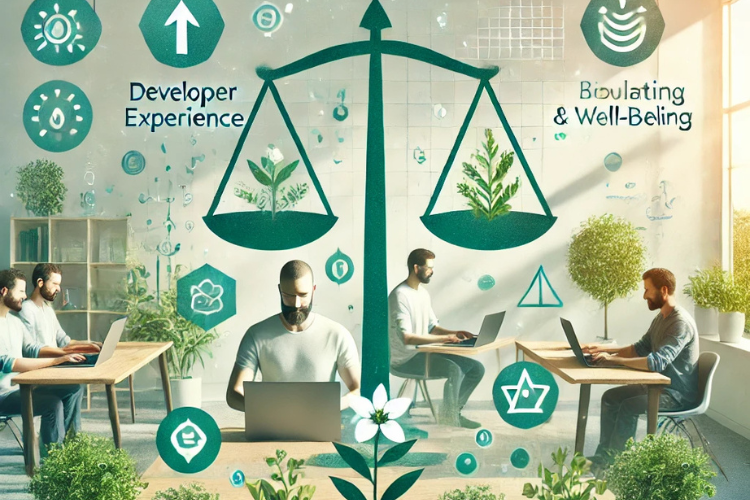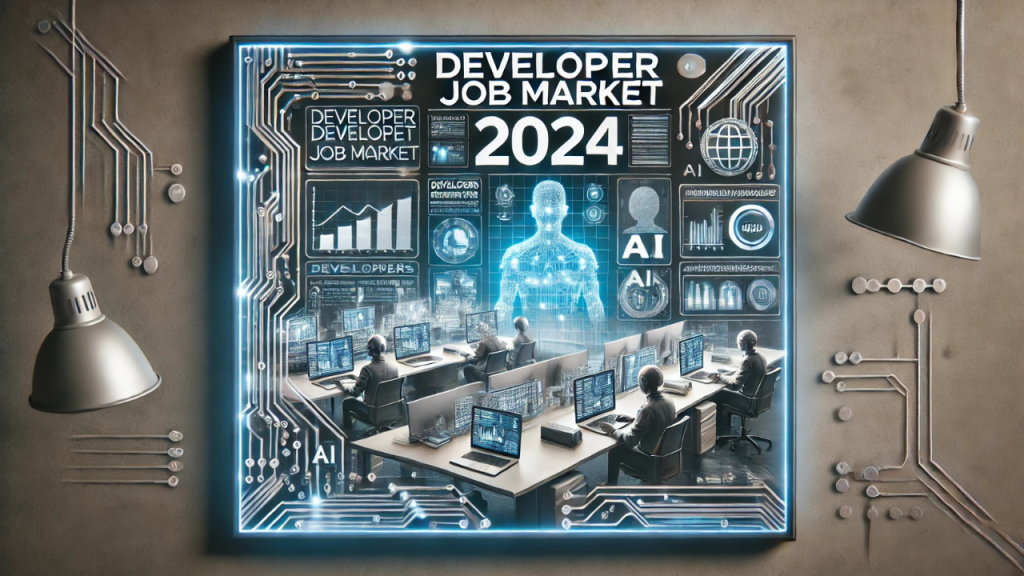The tech industry is evolving rapidly, and 2024 brings a host of changes that are reshaping the developer job market. These shifts impact how developers work, learn, and grow in their careers. A recent report by SignalFire outlines key trends that highlight opportunities for developers to thrive and challenges to navigate.
This blog delves into five significant trends influencing developers in 2024, offering insights on how to adapt and stay ahead in this dynamic landscape.
1. AI in Recruitment: A Smarter Way to Hire
Artificial intelligence (AI) is revolutionizing the hiring process, making it more efficient and precise. For developers, this transformation means better alignment between their skills and job opportunities.
AI-powered tools now handle the initial screening of candidates. They analyze resumes, portfolios, and other relevant data to match candidates with job openings based on specific criteria. These tools eliminate much of the bias and inefficiency of traditional hiring processes, ensuring that qualified developers get noticed.
Beyond matching candidates, AI also identifies skill gaps, enabling developers to focus on areas for improvement. This proactive approach benefits both job seekers and employers.
Why It Matters for Developers:
- Your technical skills and achievements take center stage, ensuring fair evaluation.
- Automated processes mean faster response times during hiring.
- Highlighting your unique expertise increases the chances of securing your ideal role.
How to Stay Competitive:
- Optimize your resume with industry-specific keywords that reflect your expertise.
- Maintain a polished, up-to-date portfolio showcasing your latest work.
- Use platforms like LinkedIn and GitHub to highlight your professional achievements and projects.
2. Remote Work Tools: Driving Collaboration Across Borders
Remote work is no longer a temporary solution—it’s the new normal for many industries, especially tech. Developers today rely on an ever-growing suite of tools to collaborate effectively with distributed teams.
Virtual communication platforms like Slack and Microsoft Teams, code-sharing tools like GitHub, and project management software like Asana are critical to maintaining productivity in remote setups. These tools facilitate seamless collaboration, ensuring that teams can work efficiently regardless of location.
The rise of AI-enhanced features within these tools is also notable. Real-time translation, intelligent task prioritization, and predictive analytics are just a few examples of how remote work technology is advancing.
Key Benefits of Remote Work Tools:
- Enable real-time collaboration across time zones.
- Improve communication through features like video calls, file sharing, and instant messaging.
- Provide transparency in task management and progress tracking.
Emerging Trends in Remote Work Tools:
- Integration of AI to automate repetitive tasks and optimize workflows.
- Enhanced security measures to protect sensitive code and data.
- Tools designed specifically for developers, focusing on code management and debugging.
Remote work is here to stay, and developers who embrace these tools will position themselves for long-term success.
3. Continuous Learning: Staying Ahead in Tech
The tech industry evolves faster than almost any other field. Developers must continuously learn and adapt to remain relevant. This need has given rise to a wealth of online learning platforms, coding bootcamps, and certification programs.
These resources offer specialized courses in emerging technologies like AI, machine learning, blockchain, and more. Many platforms also provide opportunities to work on real-world projects, giving developers hands-on experience.
Advantages of Continuous Learning:
- Keeps you updated on the latest programming languages and frameworks.
- Enhances your ability to solve complex problems and innovate.
- Opens doors to higher-paying roles and advanced career paths.
Platforms like Udemy, Coursera, and Codecademy are popular choices, offering everything from beginner-friendly courses to advanced specializations.
Tips for Lifelong Learning:
- Dedicate a specific time each week to learning new skills.
- Participate in online communities and forums to stay informed about industry trends.
- Work on personal projects to apply new knowledge and reinforce learning.
Continuous learning is more than a necessity—it’s an investment in your future.
4. Skills-Based Hiring: Breaking Barriers in Recruitment
In 2024, companies are focusing on what candidates can do rather than where they studied. This shift toward skills-based hiring is creating a more inclusive and meritocratic hiring process.
Developers are now evaluated based on their ability to solve real-world problems. Platforms like HackerRank, LeetCode, and Codewars play a crucial role in this trend, allowing developers to showcase their skills through coding challenges and practical tests.
How Skills-Based Hiring Benefits Developers:
- Reduces the emphasis on traditional degrees, opening doors for self-taught developers.
- Levels the playing field for candidates from diverse educational backgrounds.
- Encourages a focus on practical, job-relevant skills.
What Companies Look For:
- Problem-solving ability and logical thinking.
- Proficiency in relevant programming languages and tools.
- Evidence of practical experience, such as completed projects or open-source contributions.
For developers, this trend is an opportunity to stand out by demonstrating real-world expertise.
5. Developer Experience: Prioritizing Growth and Well-Being
Developers are no longer just code writers—they’re innovators who drive business success. Companies are increasingly recognizing the importance of creating environments that support their well-being and growth.

This focus on developer experience includes:
- Providing access to cutting-edge tools and technologies.
- Creating inclusive cultures that encourage collaboration and innovation.
- Ensuring work-life balance through flexible schedules and remote work options.
Employee experience platforms now integrate tools for onboarding, performance management, and continuous learning. These platforms ensure that developers feel valued and supported throughout their career journeys.
The Future of Developer Experience:
- Personalized tools to streamline workflows.
- Mentorship programs to foster professional growth.
- Focus on mental health resources to prevent burnout.
By choosing companies that prioritize developer experience, you can work in an environment that aligns with your personal and professional goals.
Conclusion
The developer job market in 2024 is undergoing significant transformations. Trends like AI in recruitment, remote work tools, continuous learning, skills-based hiring, and enhanced developer experiences are reshaping how developers approach their careers.
To succeed in this dynamic landscape, developers must embrace these changes. By optimizing your skills, adopting new tools, and staying open to lifelong learning, you can secure opportunities that align with your expertise and aspirations.
The future belongs to developers who are adaptable, proactive, and ready to thrive in a tech-driven world. Are you ready to take the next step in your career? Start leveraging these trends today to stay ahead of the curve.




